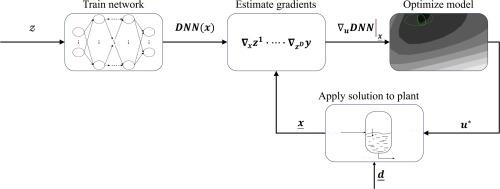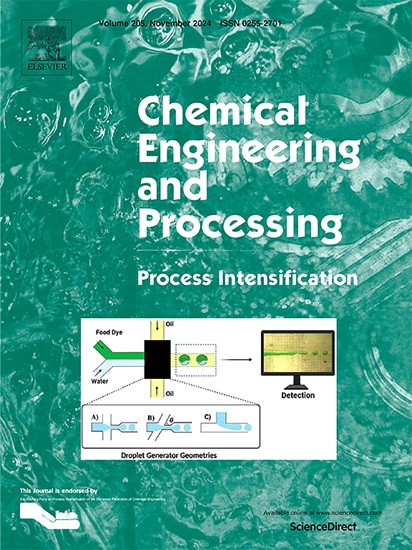深度学习辅助修饰语自适应:过程强化的协同效应
IF 3.9
3区 工程技术
Q3 ENERGY & FUELS
Chemical Engineering and Processing - Process Intensification
Pub Date : 2025-10-05
DOI:10.1016/j.cep.2025.110581
引用次数: 0
摘要
深度学习允许函数及其梯度近似于高精度。修正器自适应是一种实时优化方法,用于在线优化过程经济,需要梯度进行一阶模型修正。在这项工作中,反向传播梯度是从历史稳态数据训练的神经网络中计算出来的,因此不明确需要任何梯度数据进行训练。讨论了该方法的数据管理和收敛特性。深度学习辅助调节器自适应在模拟的集成和强化反应堆-分离器系统中进行了测试,在模型不匹配的情况下,它可以调和工厂和模型的最优值。实例研究表明,使用强化系统和深度学习辅助修饰语自适应时,具有较好的经济性和约束满足性。此外,强化和深度学习辅助修饰符适应被观察到协同工作,因为两者都加速了植物收敛到其真正的最优状态。提出的方法展示了如何利用历史数据日志来解决认知不确定性并提高基于模型的优化性能,特别是在集约化系统中。本文章由计算机程序翻译,如有差异,请以英文原文为准。

Deep-learning-aided modifier adaptation: synergies with process intensification
Deep learning allows for functions, and their gradients, to be approximated to a high accuracy. Modifier adaptation is a real-time optimization method, which is used to optimize process economics online, and requires gradients to make first-order model corrections. In this work, backpropagated gradients are computed from neural networks trained on historical steady-state data, thus not explicitly requiring any gradient data for training. Data curation and convergence properties are discussed for the proposed method. The deep-learning-aided modifier adaptation is tested in analogous simulated integrated and intensified reactor-separator systems, where it is shown to reconcile plant and model optima in the presence of model mismatch. The case studies show better economics and constraint satisfaction when using the intensified system and the deep-learning-aided modifier adaptation. Further, intensification and deep-learning-aided modifier adaptation are observed to work in tandem as both accelerate the convergence of the plant to its true optima. The proposed method shows how historical data logs can be leveraged to address epistemic uncertainty and improve performance in model-based optimization, especially in intensified systems.
求助全文
通过发布文献求助,成功后即可免费获取论文全文。
去求助
来源期刊
CiteScore
7.80
自引率
9.30%
发文量
408
审稿时长
49 days
期刊介绍:
Chemical Engineering and Processing: Process Intensification is intended for practicing researchers in industry and academia, working in the field of Process Engineering and related to the subject of Process Intensification.Articles published in the Journal demonstrate how novel discoveries, developments and theories in the field of Process Engineering and in particular Process Intensification may be used for analysis and design of innovative equipment and processing methods with substantially improved sustainability, efficiency and environmental performance.

 求助内容:
求助内容: 应助结果提醒方式:
应助结果提醒方式:


